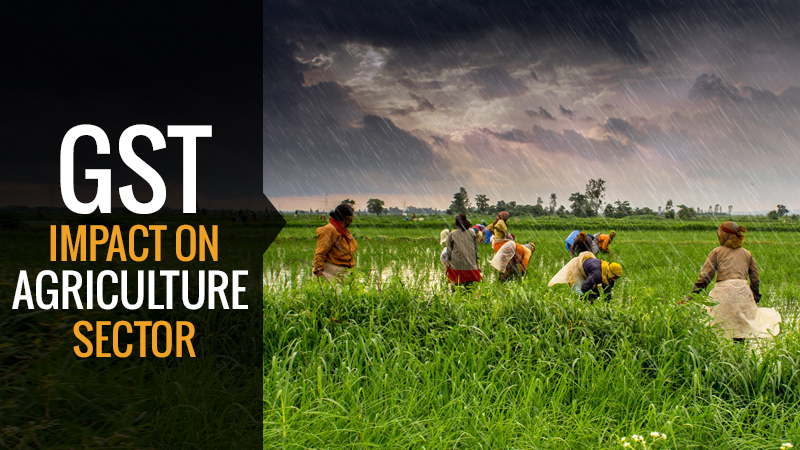The newly implemented indirect tax regime is influencing the agriculture industry and farmers due to the 5 per cent GST rates on agricultural products. It is expected that in the long term the industry is foreseen to be positive. GST was a long-awaited tax reform since Independence, which was passed by both houses of Parliament, including Lok Sabha and Rajya Sabha and came into effect from 1st July 2017 across India.
The GST Council has announced the 5 per cent GST rates on agricultural products. The introduction of Goods and Services Tax (GST) is influencing the common people living in all sections of society. We have already covered its impact on the lives of the common man and the oil and gas sector.
56th GST Council Update in the Agriculture Industry
The GST Council has given major relief to Indian farmers and the agriculture sector. It has decided to reduce the GST rate on agricultural goods such as tractors, agricultural, horticultural, or forestry machinery for soil preparation, grass or hay mowers, composting machines, etc., from 12% to 5%. The list is provided below:
| Agricultural Goods | New GST Rate From 22nd September |
|---|---|
| “Fixed Speed Diesel Engines of power not exceeding 15HP” | 5% |
| Other Hand Pumps | 5% |
| “Nozzles for drip irrigation equipment or nozzles for sprinklers” | 5% |
| “Sprinklers; drip irrigation system including laterals; mechanical sprayers” | 5% |
| “Agricultural, horticultural or forestry machinery for soil preparation or cultivation; lawn or sports-ground rollers; Parts [8432 90]” | 5% |
| “Harvesting or threshing machinery, including straw or fodder balers; grass or hay mowers; parts thereof” | 5% |
| “Other agricultural, horticultural, forestry, poultry-keeping or bee- keeping machinery, including germination plant fitted with mechanical or thermal equipment; poultry incubators and brooders; parts thereo” | 5% |
| Composting Machines | 5% |
| “Tractors (except road tractors for semi-trailers of engine capacity more than 1800 cc)” | 5% |
| “Self-loading or self-unloading trailers for agricultural purposes” | 5% |
| “Hand propelled vehicles (e.g. hand carts, rickshaws and the like); animal drawn vehicles” | 5% |
| Fertilizer | New GST Rate From 22nd September |
|---|---|
| Sulphuric acid | 5% |
| Nitric acid | 5% |
| Ammonia | 5% |
After passing so many hurdles, pump makers in India have shown tremendous growth, productivity, and quality. After the implementation of GST, various small and medium enterprises (SMEs) stopped manufacturing pumps for some time, as business enterprises were incapable of bearing the expenses under the indirect tax regime.
Presently, the total number of pumps in India is nearly 30 million, of which 80 per cent of pumps are for agricultural purposes.
Previously, the GST Council announced 12 per cent tax rates on agricultural products and later it was reduced to 5 per cent. Now, the 5 per cent GST rates will apply to all agricultural products. Ananth Kumar, Union Minister for Chemicals & Fertilisers and Parliamentary said: “The farmers of the country would benefit to the tune of Rs. 1261 crores under the GST regime. Under the new GST rates announced by the Council, the average weighted MRP will decrease to Rs. 5909/ Ton (or Rs. 295.47/ 50 kg bag) as compared to the existing All India weighted Average of Rs 5923/ Ton (or Rs. 296.18/50 kg bag)”.
However, taxing the food could have more impact on the poor. But, the exception of food can shrink the tax base as well. As we know, Agriculture is the root of the Indian economy, and the government has always kept it as its top priority. Food includes various items such as poultry, grains, cereals, dairy products, milk, confectionery, snacks, candy, etc. In India, many of the food items have been exempted from the CENVAT, while cereals and food grains are liable for the state VAT of 4 per cent.
Read Also: Goods and Services Tax Impact on Common Man
Agriculture is now again in the eyes of the council as it has been proposed that the various farm items which were earlier out of the taxation circle will now be taken into consideration as the meaning “agriculturalist” has been revised and accordingly the major sources to tax exemptions has been narrowed down to assimilate the trading products which garner the revenue out in the market once produced.
In the GST ambit, the government wishes to include as many products to gain the tax benefit in agri-based foods, which will include contract farming, dairy farming, frozen foods, seed raising, and food processing. These agricultural activities are directly attached to retailing as big chains contract with the farmers and take a lot towards their commercial processing. However, the impact on agriculture for the long term is assured to be beneficial, along with the improvement in the supply chain.
Meanwhile, the Tea industry feels that it should be exempted from GST. Tea is the most popular thing in India after water and 5 per cent GST rates on branded food grains, including mild (i.e. de-husked and split) pulses. Thorat asks, “The idea behind value-addition through processing and creating a brand is to enable our farmers to realize more for the products they are supplying. But if such a branded value-added product is now going to be taxed at 5 per cent, what’s the fun?.”
The new tax regime provides transparency and certainty in the tax system. The main aim of implementing Goods and Services Tax (GST) is ‘One Nation, One Tax, One Market‘. Globally, It is simple, and efficient and will help to improve the economic growth of the country by eliminating a dozen of central and state levies like excise, service, and VAT.
Yogesh Thorat, Managing Director of MAHA-FPC said: “We want to grow beyond doing PSS business. But the 5 per cent GST on branded pulses puts a dampener on the plans, especially of FPCs that are eyeing the retail market to maximise their farmer-members’ share in the consumer rupee.” He further added that GST’s cost is not just about adding 5 per cent to the product price: “There is also the cost of compliance. One must keep in mind here that FPCs are all in rural areas. For their owners, who are farmers, this is their first experience in corporate dealing. Uploading daily invoices and filing returns thrice every month is certainly a deterrent, just when they have started doing business.”










Registration
Yes they have to take registration since agriculturist defined u/s 2(7) contains only Individual or HUF not companies.
and Companies comes under section 2(84) Definition of person which further comes in definition of Taxable person hence agriculture companies has to take registration.
We would be interested to know the industries directly or indirectly related to Agriculture which are exempt from taxes including Excise, VAT,CST etc The information may also be shared for food grains, irrigation projects, drip irrigation. farm machinery, tractors, fertilizers, seeds , agro-chemicals and water related.